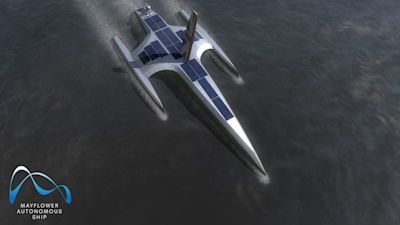World's first 'self-driving' ship prepares for Mayflower sea trials in Plymouth

An autonomous ship is preparing to take to the water for sea trials off the coast of Plymouth.
To mark the 400th anniversary of the Mayflower voyage in 1620, an unmanned vessel has been built using cutting edge technology.
If successful, it will become the world's first full-sized self navigating vessel to cross the Atlantic Ocean - and the team behind the project believes it will usher in a 'new era'.
Co-director Brett Phaneuf said: "Putting a research ship to sea can cost tens of thousands of dollars or pounds a day and is limited by how much time people can spend on board – a prohibitive factor for many of today's marine scientific missions.
"With this project, we are pioneering a cost-effective and flexible platform for gathering data that will help safeguard the health of the ocean and the industries it supports."
The ship will carry three research pods containing sensors and scientific instruments to monitor maritime cybersecurity, marine mammal activity, sea level mapping and ocean plastics.
The results will be fed back to scientists at the University of Plymouth.
Andy Stanford-Clark, chief technology officer at IBM UK & Ireland, said: "IBM helped put man on the moon and is excited by the challenge of using advanced technologies to cross and research our deepest oceans.
"By providing the brains for the Mayflower Autonomous Ship, we are pushing the boundaries of science and autonomous technologies to address critical environmental issues."
Professor Kevin Jones, executive dean of science and engineering at the University of Plymouth, added: “This voyage has the potential to be a real game-changer and cements Plymouth’s reputation as a world-leading hub of marine science. It gives us the genuine capability to explore new and innovative research opportunities that have not previously been possible.
"It also raises the bar in terms of autonomous vessels, a world first that could set the standard for others in the field to follow.”
READ MORE: